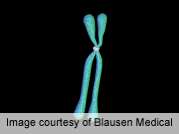Whole-exome sequencing IDs genetic cause in quarter of cases

(HealthDay)—For patients with suspected genetic disorders, whole-exome sequencing identifies the underlying genetic defect in 25 percent of cases, according to a study published online Oct. 2 in the New England Journal of Medicine.
Yaping Yang, Ph.D., from the Baylor College of Medicine in Houston, and colleagues developed technical, bioinformatic, interpretive, and validation pipelines for whole-exome sequencing for 250 probands with suspected genetic disorders. Children with neurologic phenotypes accounted for about 80 percent of the patients.
The researchers identified 86 mutated alleles, which were likely to be causative in 62 patients (25 percent molecular diagnostic rate). More than half of these patients (33) had autosomal dominant disease, 16 had autosomal recessive disease, and nine had X-linked disease. Four probands received two non-overlapping molecular diagnoses, which were distinct from the clinical diagnoses made based on history and physical examination. Eighty-three and 40 percent of the autosomal dominant and X-linked mutant alleles, respectively, occurred de novo. Thirty-nine patients had rare genetic disorders that were seen only once in the study, and 23 had recurrent clinical phenotypes.
"Whole-exome sequencing identified the underlying genetic defect in 25 percent of consecutive patients referred for evaluation of a possible genetic condition," the authors write.
More information:
Abstract
Full Text
Editorial
Copyright © 2013 HealthDay. All rights reserved.















